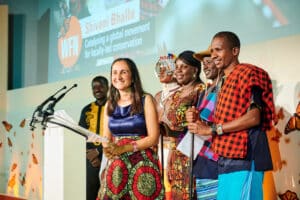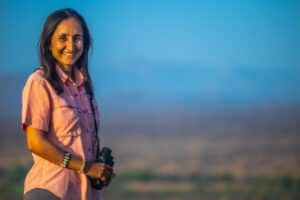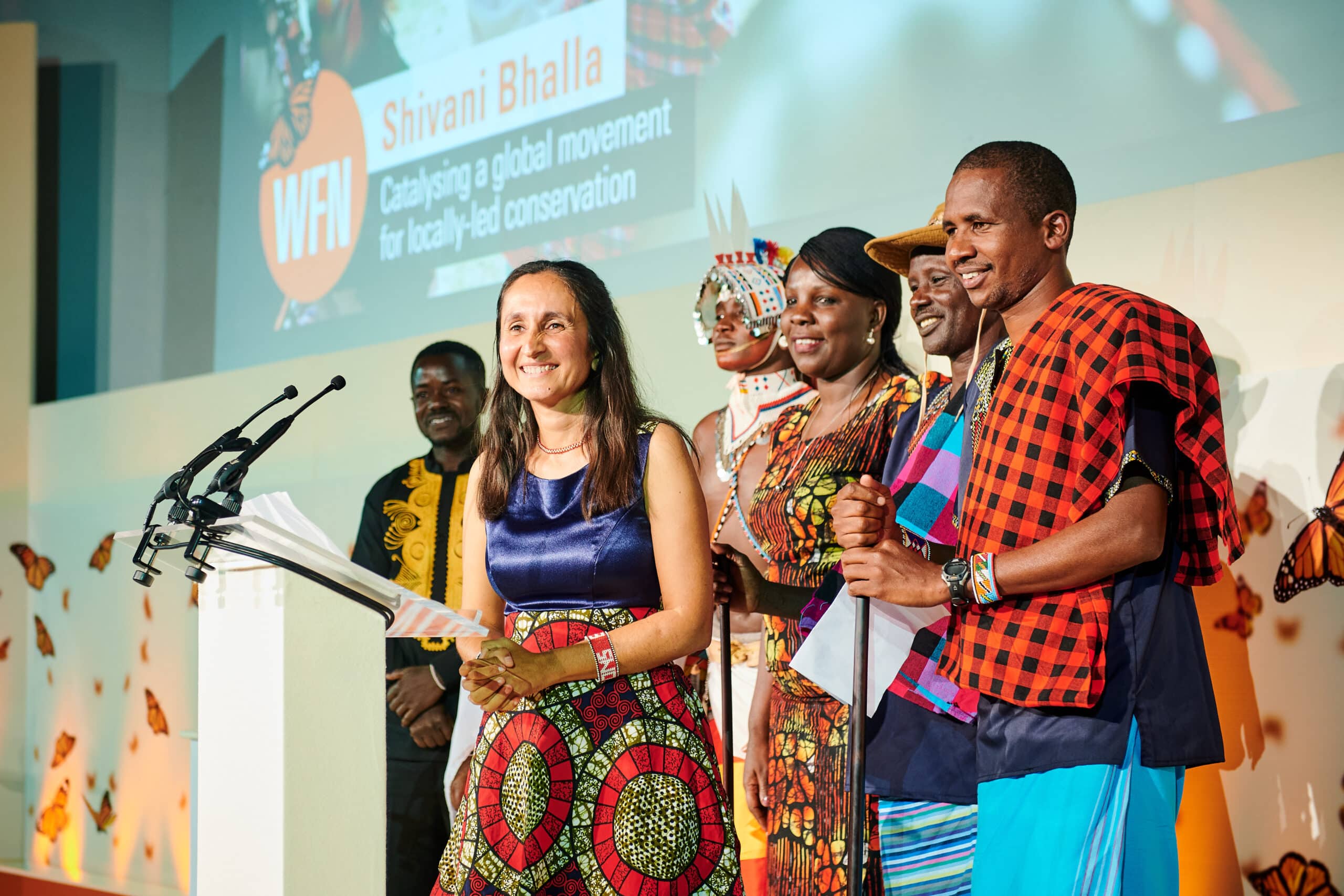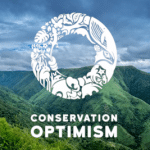Welcome to a special edition of “Meet the Optimists”, featuring winners of the 2023 Whitley Awards. Hear inspiring stories and advice directly from these incredible conservationists, and download Kids’ Corner resources relating to their work too!
Born and raised in Kenya, Dr. Shivani Bhalla believes the key to lion conservation is working in partnership with local communities. She founded Ewaso Lions in 2007 to promote co-existence between carnivores and people, and she and her team have created successful community programmes including Warrior Watch, Mama Simba, Lion Kids Camps and Kura’s Pride.
Shivani has a DPhil in Zoology from the University of Oxford, a Master of Science in Wildlife Conservation from Napier University and a Bachelor of Science in Environmental Science from Lancaster University. Previously, she has worked for the Kenya Wildlife Service and Save the Elephants. Shivani moved to Samburu in 2002 and lives in the Ewaso Lions Camp in Westgate Conservancy with her team and two dogs, Kura and Nanyori. She is the recipient of the 2023 Whitley Gold Award from the Whitley Fund for Nature.

Dr. Shivani Bhalla at the Whitley Awards Ceremony. [Photo by Gabriel Bush, provided by Whitley Fund for Nature]
I was born and raised in Kenya, and I would go on a lot of safari trips with my parents. Over time, I realised that wildlife in Kenya were in trouble, and I felt it was my duty and responsibility as a Kenyan to really do something to protect what is ours.
This motivated me to pursue my university studies in conservation. After that, I moved to Samburu – this was over 20 years ago – where I started Ewaso Lions with the goal of understanding the issues that lions face in northern Kenya. The species was in decline across the entire African continent, including in my own country. With only about 2,000 lions left at that time, I felt it was really important to understand the population in northern Kenya and how we can work alongside communities to secure a future for them.
Our mission is to promote coexistence – or rather, continued coexistence – between people and lions, since Samburu communities have coexisted with lions and other wildlife for generations. It’s becoming much harder to sustain this coexistence, due to factors such as lack of wild prey for lions, habitat fragmentation by human settlements, as well as climate change and drought. We have been supporting the communities in whatever way possible to remedy these challenges. Our work includes programmes that are community-led, tracking the movement of lions in order to avoid confrontation with humans and livestock, and recovering lion habitat to help local ecosystems thrive.
Tell us about a challenge that you faced, and how you overcame it.
We face many challenges here. I would even say, sometimes we face back-to-back crises! Whether it’s drought, flooding, disease outbreaks, or locust invasions.. sometimes it feels like it’s never-ending. And one way we’ve overcome it is by not looking at it as a crisis anymore. So, for example, rather than saying to ourselves, ‘Oh, gosh, we’re in another drought. What are we going to do about it?’, we treat it as another thing to manage in our day-to-day.
Generally speaking, I overcome any challenges that I come across by discussing and working to manage them with our extraordinary team that I’m very grateful to be a part of. In this way, the challenges are not faced alone, but assessed collectively. I think that sometimes my way of thinking could be quite limited but, by bringing in other perspectives and thoughts, a better solution can be found and we can overcome the challenges together. In other words, I don’t figure it out alone. It’s a collective discussion.
What was a key moment in your conservation career? Describe it as vividly as possible.
There were actually two key moments in my career that happened around the same time, a year and a half ago. I can’t remember when it was specifically, but one evening I was in my house in our camp, and suddenly the WhatsApp groups for our various teams were all lighting up; messages were coming in from all our different programs. Mama Simba, our programme started by the Samburu women themselves to engage in conservation in northern Kenya, was reporting on all their accomplishments on that specific day. I also received similar reports from another programme, Kura’s Pride, which works to support the health and welfare of Samburu’s pet dogs. Our lion teams were messaging saying they had seen lions in three different areas. Our community team was reporting on how many meetings they had had that day.
I realised that I had gone from starting a project where I was in charge of doing everything and obviously having limited impact, to suddenly working alongside a team of 65 where various programs were operating independently and getting on with things even without me. It was a really great moment to just recognise how it’s no longer just me, but our whole team that has ownership over their work and what they do.
Not long after that, we all gave a very important presentation to our government in a meeting that had taken us two years to arrange. We were given three hours to talk about the work that Ewaso Lions does. And, I couldn’t believe it, but in those three hours, I only spoke for five minutes, maybe even less. Again, this moment really showed that Ewaso Lions has gotten to a stage where I have my own role now, which is mainly fundraising, while the rest of my team basically get on with all their work and are able to stand up in front of the government and present their work so passionately and with such dedication.

Dr. Shivani Bhalla in Samburu, Kenya. 2014. [Photo by Anthony Ochieng, provided by Whitley Fund for Nature]
My vision for the future is to see communities lead conservation efforts as part of their way of life, perhaps in a world where there’s no word for ‘conservation’ because it’s just what everyone does on a daily basis. I feel like with the global biodiversity crisis we’re in, this is one of the only solutions we’ve got: having people care and incorporate protection of the natural world in their daily life.
What keeps you optimistic about the future of nature?
For me, having communities lead any conservation effort is really what keeps me optimistic about the future. I also find optimism in my team, our Samburu community who have so much courage to live alongside lions, as well as the lions themselves who have so much courage to continue to live alongside people.
What is the “pearl of wisdom” that you would hand on to a budding conservationist?
In the conservation world, there is unfortunately a perception that conservation is for a sort of “heroic figure”; there’s this one person to do conservation, this “one-face” model. And you look around and the reality is exactly that there’s so many conservation projects with just one “face”. I believe we need to change that. As an up-and-coming conservationist, you should be thinking about building a team, building capacity, and ensuring there’s collective visibility. A conservationist should do everything in their power to move away from that “one-face” model, which is unsustainable and extremely damaging to conservation, and instead give recognition to everyone working on that issue as opposed to just themselves. That’s my first piece of advice.
Secondly, and this is a slightly harder one: always think about your exit plan. This is a bit hard to do when you’re just starting out, but conservationists sometimes do this in their 80s and 90s. I feel that we should be thinking about succession, transitioning, and inspiring a new generation to take over from you. So as you’re starting out, think about what that exit strategy might be in 10-15 years’ time. I’m not saying start doing it then! But just have it in your mind. And when you’re midway through your career, really start being very intentional about all the things that you need to do to eventually hand over your work. For me, this is very important considering the ever-changing conservation landscape that we’re in. We all need to not be stuck in our way. We need to be open to change, to having new ideas and new perspectives. So, I do feel like considering transition and succession at the early stages is a good idea.


